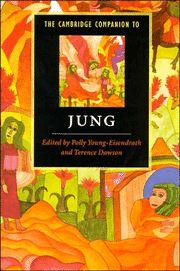Book contents
- Frontmatter
- Introduction
- Part 1 Jung's ideas and their context
- Part 2 Analytical psychology in practice
- Part 3 Analytical psychology in society
- 11 Gender and contrasexuality
- 12 A Jungian analysis of Homer's Odysseus
- 13 Jung, literature, and literary criticism
- 14 Jung and politics
- 15 Jung and religion
- Glossary
- Index
- References
13 - Jung, literature, and literary criticism
from Part 3 - Analytical psychology in society
Published online by Cambridge University Press: 28 May 2006
- Frontmatter
- Introduction
- Part 1 Jung's ideas and their context
- Part 2 Analytical psychology in practice
- Part 3 Analytical psychology in society
- 11 Gender and contrasexuality
- 12 A Jungian analysis of Homer's Odysseus
- 13 Jung, literature, and literary criticism
- 14 Jung and politics
- 15 Jung and religion
- Glossary
- Index
- References
Summary
What part of me, unknown to myself, is it that guides me?
(Fernando Pessoa, 1917)Every artist is a mediator for all others.
(Friedrich Schlegel, late 1790s)Jung would often insist he was an “empiricist.” So one might expect his work to have been based on the analysis of his clients' case histories. Instead, one finds that many of his major ideas were derived from his interpretation of a remarkable range of texts - from an account of a young woman's fantasies (as published in a clinical journal) to the Book of Job, and from spiritual texts of the East to the writings of Western alchemists. Thus it is somewhat disappointing to discover that his three essays on the psychology of specifically literary texts are amongst his least successful work (CW 15, pp. 65-134). His essay on James Joyce's Ulysses (1932) is embarrassingly vague and the distinction he made in 1930 between two modes of artistic creation - between “psychological” works (whose psychological implications are fully explained by the author) and “visionary” works (which, confusingly, “demand” a psychological commentary) - is neither convincing nor useful.
- Type
- Chapter
- Information
- The Cambridge Companion to Jung , pp. 255 - 280Publisher: Cambridge University PressPrint publication year: 1997
References
- 2
- Cited by



